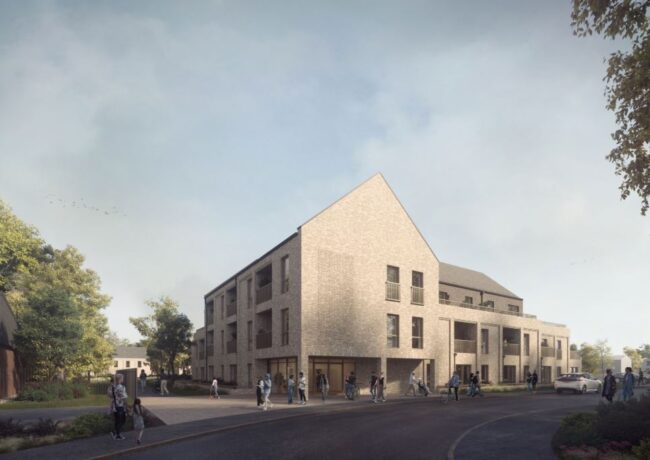Place10: Diversify and thrive
In 2007, I lived in a one-bedroom apartment, wasn’t married, had no kids, no pets, was an outright retail planner working almost exclusively on a range of Tesco projects, and had a respectable hairline. Come 2017, I cannot claim any of that to be true, writes Sebastian Tibenham, executive director at Pegasus Group.
I’m married, have two kids, three pets, work across a range of development sectors, my retail client, now Asda, makes up just 10% of my workload.
Am I happier and more sustained at work and at home? Yes! Why? Diversification.
Not only is diversification important in running a business, and experiencing day to day life, it is vital for our towns, cities, the economy and our industries. Unfortunately, the planning industry in the North West, and particularly the housing sector, a fundamental industry within our economy, was too targeted and not sufficiently diverse in 2007 to recover quickly from the deep recession.
Throughout 2007/8, the proportion of housing completions in the North West comprised of 51% houses and 49% flats. This continues to represent the most evenly distributed proportions across these two main dwelling types since records began. However, bearing in mind only 19% of the £2.5m households in the North West comprised of flats, apartments and maisonettes in the 2001 census, it was debatable at the time if the housing mix being constructed represented a stable reflection of the diverse housing needs that existed and our longer-term requirements.
It can be said that we were planning for much need urban regeneration, smaller households, an ageing population and a rising young professional and student population. The trouble is that of the 18,470 dwellings completed in the North West in 2007/8, up to 70% of were two-bedroom properties in a region where we are inundated with the classic two-up, two-down industrial home with a small back yard. Moreover, the bulk of this delivery would have focused on the two city regions given the North West Regional Spatial Strategy was in place at the time. Clearly many benefits have come to pass through the regeneration of our city centre landscapes and I’ve no doubt that the re-population of these centres has played a critical part.
However, this strategy was far too focused and we all know what happened next. The financial markets collapsed, the housing industry dropped to 6,990 completions across the North West in 2008/9, unfinished apartment structures dotted the landscape, I outgrew my apartment four-fold and around the same time my hair fell out!
Moving forward, the proportional houses vs apartment completion rates stood at 80% vs 20% in 2011/12 in the North West and there were more three and four bedroom homes completed, to 70%. Whilst encouraging in percentage terms, this was against a feeble backdrop of 9,810 completions. Since then, regional data on house-type split has not been collated but the split across England is now 75% homes vs 25% apartments. I suspect the North West will not be far off this, which represents a more equitable mix of dwelling types. Completion rates have also increased to 14,300 in 2016/17. Unfortunately, this figure is still woefully short of the requirements bearing in mind the requirement for Greater Manchester alone is argued by many to stand at 16,000 per annum.
Critically, every single component of the Northern housing industry needs to be firing on all cylinders if the powerhouse is to truly get going.
My principal concern is that the development patterns and housing mix currently being developed in our regional cities continues to reflect a period that we ought not wish to see again. Whilst public funds/loans are being put to excellent use to stimulate the construction of new apartments and continues to result in positive regeneration, we also need to actively plan for the future and the diverse growth of our cities, which are targeting high-worth industries in science and technology, R&D, media, and finance
A question we have to ask now, particular at a time when the likes of the GMSF is planning for the next 20 years, is: “Where will those who bought apartments pre-2007, or as part of the latest surge, want to live in the next 10/20 years?” Also, are we doing enough, quickly enough to ensure they can be accommodated within Greater Manchester or Liverpool, or will we continue lose them to the counties or the South?
Thankfully, Knowsley and, to a degree, Sefton, have committed to accommodate some of Merseyside’s suburban needs and roll back their Green Belt. St Helen’s and Warrington are seemingly on their way. Other areas such as Wirral are rife with rumour but have yet to take the plunge. Nevertheless, at least Liverpool’s City Region has some long-term plans in place that will continue to confidently direct developers to opportunities they can take up in economic times of good and bad.
With only Wigan having adopted some long terms housing development opportunities to date, the last draft of the GMSF also provided some hope for the Manchester City Region. Whilst it still needed to go further in my opinion and I am sure there are valid reasons, the recent vote to delay the next draft publication of the GMSF to June 2018 is certainly not great news for growing families and households in urgent need, particularly when Greater Manchester’s planning and housing industry has yet to rid restrictive shackles that where compounded by the last downturn.
- To take part in the Place10 series reflecting on the decade since Place North West was first published in August 2007, send your stories and memories to news@placenorthwest.co.uk headed ‘10’.




